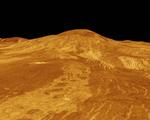Other

“An analysis of data from Magellan’s radar finds two volcanoes erupted in the early 1990s. This adds to the 2023 discovery of a different active volcano in Magellan data. Direct geological evidence of recent volcanic activity on Venus has …

“In a first, scientists have seen direct evidence of active volcanism on Earth’s twin, setting the stage for the agency’s VERITAS mission to investigate. Direct geological evidence of recent volcanic activity has been observed on the surface of …

“The research uses archival NASA data to show that Venus may be losing heat from geologic activity in regions called coronae, possibly like early tectonic activity on Earth. Earth and Venus are rocky planets of about the same size and …

“NASA has selected two new missions to Venus, Earth’s nearest planetary neighbor. Part of NASA’s Discovery Program, the missions aim to understand how Venus became an inferno-like world when it has so many other characteristics similar to ours …

“As a key partner in the mission, NASA provides the synthetic aperture radar, called VenSAR, to make high-resolution measurements of the planet’s surface features. On June 10, 2021, the European Space Agency (ESA) announced the selection of EnVision as …

“During a brief swing by Venus, NASA’s Parker Solar Probe detected a natural radio signal that revealed the spacecraft had flown through the planet’s upper atmosphere. This was the first direct measurement of the Venusian atmosphere in nearly …

“Is there life on Venus? A new discovery suggests we should look harder. Discovering life beyond Earth may well start with a sniff, a whiff of some chemical that scientists struggle to explain without invoking a strange, shadowy microbe. That …

